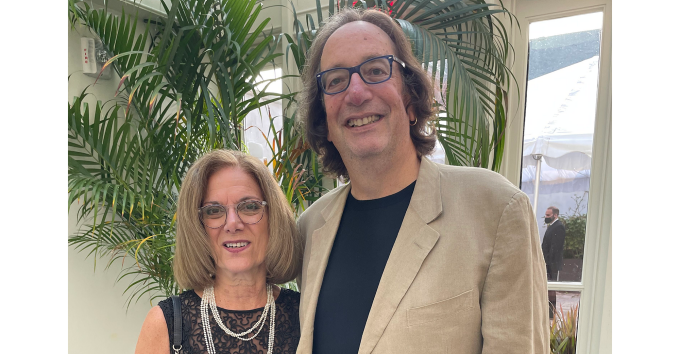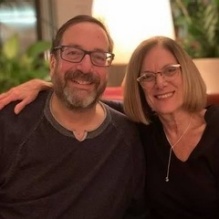
A $1 million gift supports law school’s clinics
Lew Rose ’81 credits his experience at UB School of Law as the foundation for his long and successful career. Now, having retired from the New York City firm where he was managing partner, he and his wife, Jacqui, are saying thanks with a transformative gift for the law school’s clinical programs.

The $1 million bequest will create the Lew and Jacqui Rose Fund for Clinics, an endowment that will generate at least $40,000 a year to support the work of the school’s expansive clinical program. The program currently includes 10 clinics that provide students with practical training and exposure to a wide array of access to justice issues including civil rights, domestic violence, criminal justice, and more. The gift will nourish the talent and passion of our student attorneys, while furthering the law school’s commitment to serving the public interest.
“Lew and Jacqui’s incredibly generous gift will ensure that our students always have opportunities through our clinical programs to experience what it means to serve justice,” says Dean Aviva Abramovsky. “Their vision and support will help cultivate the next generation of great UB Law lawyers.”
Adds Emilie Rosenbluth, associate director of advancement, who helped structure the gift: “Lew has been a longtime supporter of the law school in so many ways—through his past involvement in the Law Alumni Association and his willingness to help mentor and place students and share his expertise by teaching seminars. We are so grateful for his longstanding commitment to our clinical program and our students throughout his career and now in creating this permanent source of funding that will live on in perpetuity.”
Rose built his career around expertise in advertising law. A native of the New York City area, he studied political science at UB before entering law school. Early in his career he worked in Washington with the Federal Trade Commission, where he specialized in enforcing trade regulation rules and orders, civil penalty actions and consumer redress actions. He then served as an assistant to the director of the Bureau of Consumer Protection, and as an attorney adviser to FTC Commissioner Calvani.
But he spent the majority of his career with the firm now known as Kelley Drye, an international firm comprising more than 350 lawyers and other professionals. In private practice, Rose specialized in consumer protection, advertising and consumer product safety law. He represented clients before federal and state law enforcement agencies, as well as self-regulatory bodies such as the National Advertising Division of the Council of Better Business Bureaus. He also co-authored a treatise on advertising law.
In 2013, the firm named Rose managing partner in its Washington, D.C., office. Two years later, he went on to serve as managing partner of the entire firm, working from its New York City headquarters.
A person of wide-ranging interests—his Twitter handle bears the legend “Advertising Lawyer, Intrepid Knitter, Fearless Photographer, and Concert Goer”—Rose agreed to share some thoughts about his career, his gift, and his memories of the law school, where it all began.
What are the most vivid memories you have of your time at the law school? Were there individual professors who made a difference for you?
I remember my first year most clearly. Like most students, I had tremendous anxiety about whether I was up to the challenge among peers who were all incredibly talented. I thank [Professor Jack] Schlegel for getting me past that fear. He called on me early in the first semester in Civil Procedure. I answered his question (“What’s the plaintiff’s problem?” in that distinctive voice of his) and he asked me if I thought my answer was correct. I said yes, and he said I should research the answer. I replied that I had not yet taken Legal Research and had no idea how to start. He said he would take me to the library after class and show me. I was not sure he was serious but waited after class, and he walked up to me and said, now in his deepest voice, “Follow me.” I did, and he showed me the USCA and said the small numbers pointed to “those books over there.” I spent the night in the library, and he called on me the next class. I gave my report and he said, “Well done.” That took all the fear out of law school, and Schlegel and I have stayed in touch for the past 43-plus years. Remarkable.
Fred Konefsky and James Atleson (both now retired) also deserve mention. I learned a lot about how to analyze why cases were decided in a certain way, not just what the case stood for, from both of them. And finally, although he was not a professor when I attended UB Law, Mark Bartholomew invited me to speak to his advertising law classes over the years. This kind gesture kept me involved with the law school.
As you look back on your career, what role did UB Law, and what you learned there, play in your life’s work?
I am grateful to have attended UB Law. I was able to get a first-rate legal education without tremendous debt. Over the course of my career, I concluded that my education at UB Law was equal to or better than the education I would have received at the Ivy schools, and much more practical. The low debt enabled me to start my career as a government lawyer rather than at a private law firm, which was not appealing to me at that time.
Early in your career you worked with the Federal Trade Commission. Would you recommend government service for a lawyer hoping to work in the public interest?
Absolutely. I was given tremendous responsibility early in my legal career. I was able to run my own cases while receiving great input from my colleagues about how to do that. I learned about all the rules and regulations that the FTC enforced and had the opportunity to work on cases involving car defects, funeral home abuses and prosecuting consumer fraud. It was a tremendous experience for six years, and I strongly recommend government service to any of our graduates.
Your gift will support the law school’s Clinical Legal Education program, which has grown substantially over the past several years. Did you take part in any clinics at UB Law? What was that experience like?
I participated in a Prisoners’ Rights Law Clinic. My friend and colleague Melanie Pierson and I went to Attica [State] Prison and interviewed inmates who were in the punitive segregation unit (the “Box”) at Attica. They described conditions of confinement that we believed were cruel and unusual punishment. We filed a class action lawsuit on their behalf. We graduated and I lost track of the lawsuit, but I will never forget the experience of walking into that prison and meeting my first clients. The guards wanted to keep the door open to the lawyer interview room, but we closed it every time so our clients could speak freely to us. It was an extremely valuable experience.
What made you decide to make this gift at this particular time?
The world, our country and our communities have gotten very polarized over the recent past. Jacqui and I hope that our gift will not only help law students get very valuable training to launch their legal careers, but also help solidify the law school with the local community.
You’ve experienced great success as a lawyer. What advice do you have for our students about the keys to success?
Be nice! To everyone. It will make you memorable, and folks will go out of their way to help you.